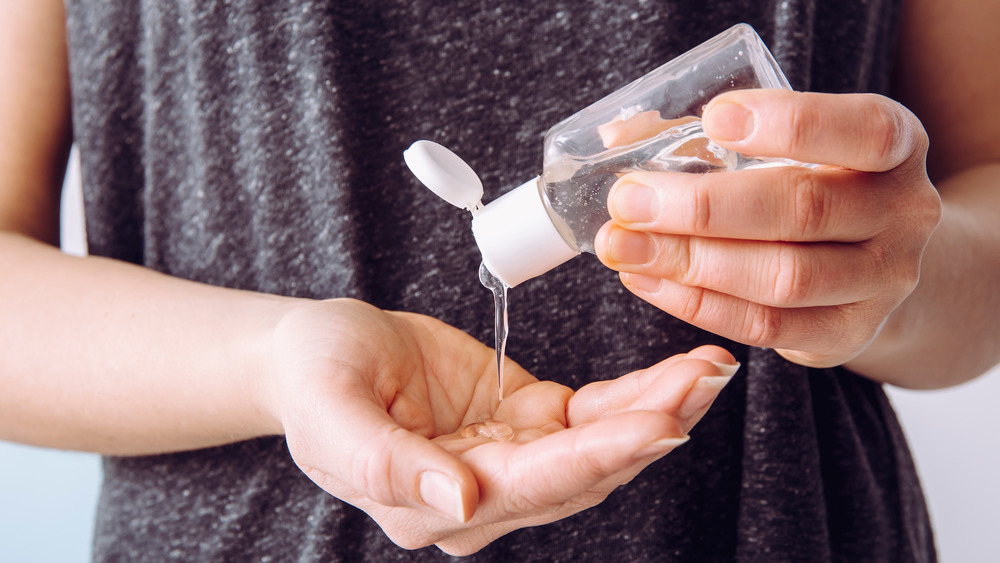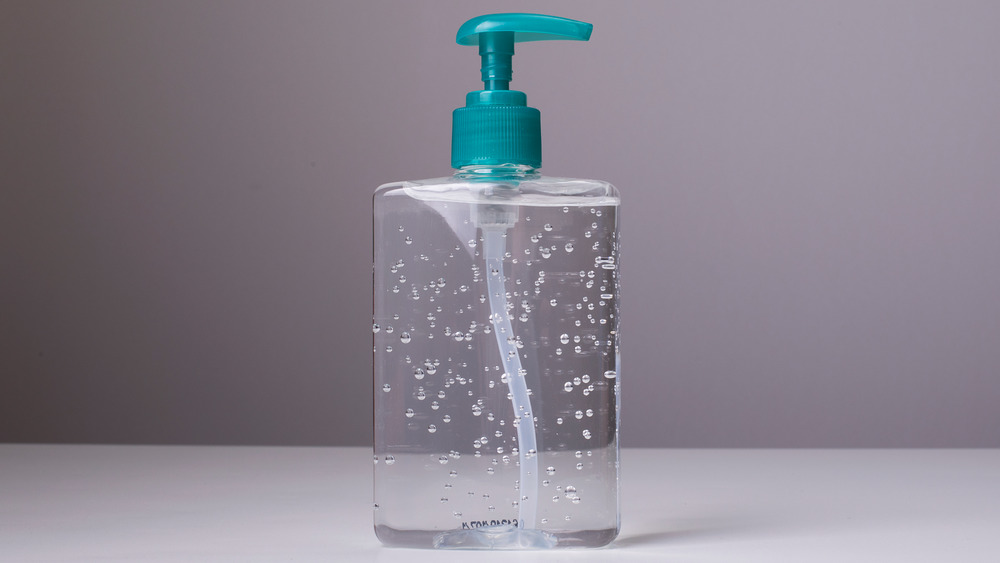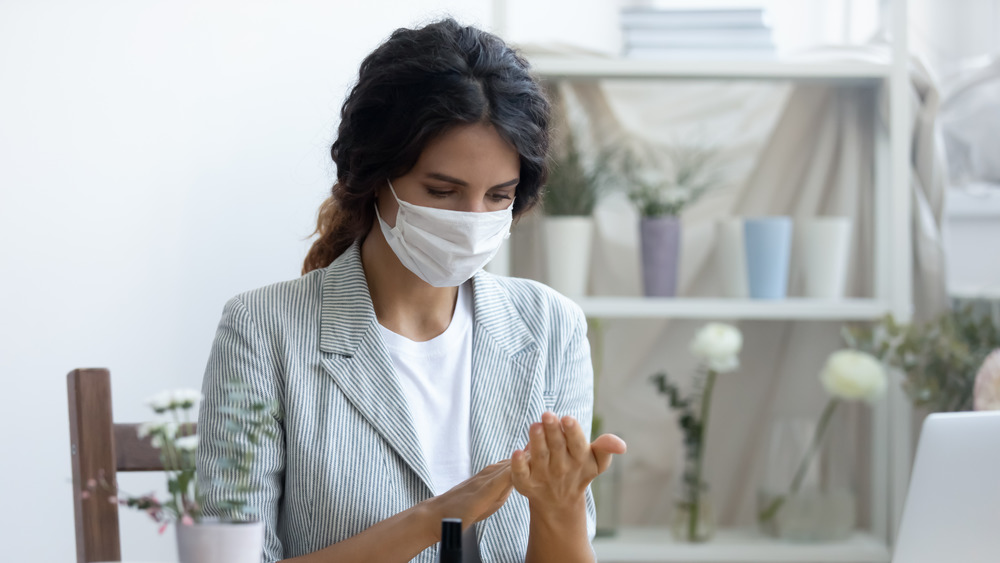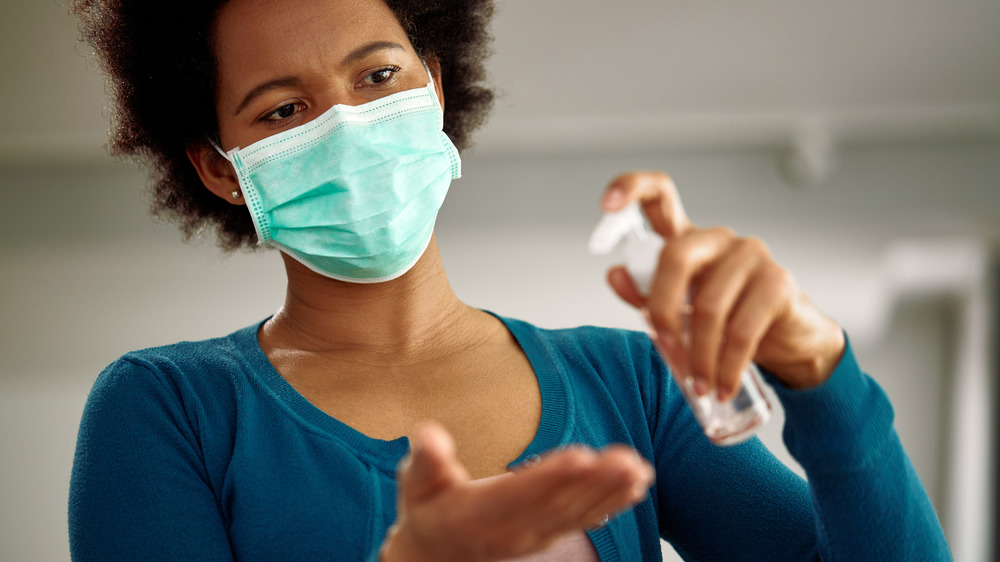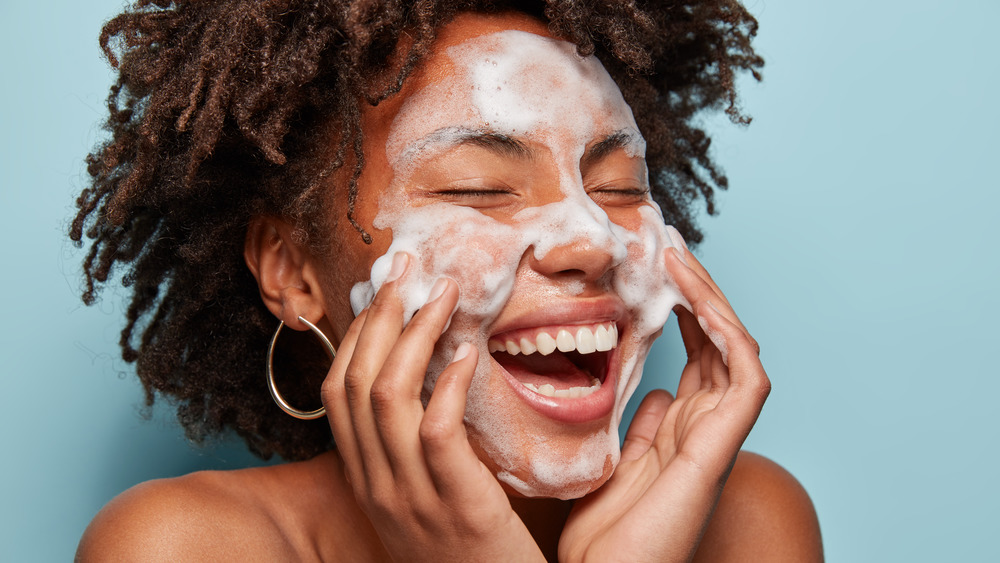Why You Should Never Put Hand Sanitizer On Your Face
Should you put hand sanitizer on your face? In a world where people need to be told not to Gorilla Glue their hair, and the Harvard Medical School has to explain to the world why teenagers are eating Tide pods, it doesn't seem nearly as outlandish a question as it might have a decade ago. But as the coronavirus pandemic made hand sanitizer as much a part of our daily routine as toothpaste and toilet paper, curiosity about how it should and shouldn't be used abounds.
The short answer as to whether or not you should ever use hand sanitizer on your face is no, since the word "face" appears nowhere in the product's name. But to learn why, exactly, using the same stuff to disinfect your face as you do to disinfect your hands is not the best idea, we chatted with some medical professionals to get the science behind it — and hopefully, in the process, stave off another bad trend of people horribly misusing a product.
It dries out your skin if you put hand sanitizer on your face
Hand sanitizer, if you read the ingredient list, is mostly alcohol. That doesn't mean it should be your new favorite cocktail to take into the shower, but rather should teach you how alcohol's chemical properties help sanitize your hands. According to Dr. Peterson Pierre, founder of the Pierre Skin Care Institute, alcohol acts to break down the lipids or fats in bacteria and virus' cell walls, effectively killing them. But there is a flip side to this germ-killing superpower. "Alcohol and propylene glycol draw moisture out of the face," Dr. Pierre told The List. "It's the process of osmosis; the moisture is going to travel from your skin to where it's needed, and since alcohol has less (moisture) it's going to go in that direction."
The result is a massive loss of moisture from your skin, and perpetual dryness on your face. That leads to drying, cracking, and lots of irritation. "If you have oily skin you might be able to get away with it," adds Dr. Pierre. "But if you have dry skin you won't be happy after a few applications."
Other ingredients in hand sanitizer can be harmful to your face
Alcohol, however, isn't the only ingredient in hand sanitizer. A look at Purell's ingredient list includes Tocopheryl acetate, barbadensis leaf juice, and cubeba fruit oil. And do YOU know the effect that cubeba fruit oil has on your skin? Probably not. Additionally, you'll find ingredients like aloe in many brands of hand sanitizer, included to help moisturize skin and counteract the drying properties of alcohol. These may be all well and good on your hands, but can clog pores and have other negative effects on your face.
Skincare experts Garnier point out that excessive moisturizer on your face can cause clogged pores and blackheads. On its website, Divine Dermatology advises against an ingredient called triclosan, which is sometimes used in place of alcohol. It can cause allergic reactions in many who aren't familiar. And in June of 2020, during the height of the hand sanitizer boom, the FDA warned of some sanitizers that contained methanol, and alcohol that can actually be toxic in some circumstances. While the FDA ultimately recalled the products, it still went to prove that not everyone is fully aware of everything in a bottle of hand sanitizer.
If you have sensitive skin, hand sanitizer can burn your face
At some point in your life, probably at a college party or on your 21st birthday, you took a shot of an irrationally high ABV spirit like 151 proof rum — and it felt like someone had lit a fire in your esophagus. That's because, according to Healthline, alcohol can irritate your throat, which is why you may sometimes be hoarse after a night of drinking. Combine that with alcohol's ability to dilate blood vessels, putting more blood into whatever surface it touches, and that's a recipe for some serious burn.
Now imagine you're taking a 70 percent alcohol solution (that's 140 proof) like hand sanitizer, and putting it on some of the most sensitive skin on your body. It's not a pleasant experience, especially not if you have overly sensitive skin. "You can also burn your skin, especially if you're sensitive to sun or other things," facial plastic surgeon Dr. Jacob Steiger told The List. "You have to remember, the skin on the hands is much thicker, and that's what hand sanitizer is for."
Hand sanitizer is highly irritating to your eyes
Anyone who's inadvertently gotten shampoo in their eyes knows the burning sensation that comes with foreign liquids getting in your ocular space. And shampoo, unlike hand sanitizer, has no alcohol in it most of the time. Now take that irritation, and add to it the inherently flammable feeling of alcohol, and you've got yet another reason hand sanitizer shouldn't come anywhere near your face.
Alcohol is especially nasty on eye tissue because of its principal molecule: ethanol. According to the Centre Daily Times, ethanol acts in two ways to harm your eyes. First, it effectively kills the cells in your cornea. And second, it irritates the outer layer of your tears called the lipid layer. As you may recall, the property of alcohol that makes it so effective at killing bacteria — its destruction of lipids — also wrecks havoc on your eyes. And if you're putting hand sanitizer on your face, you're putting all that alcohol dangerously close to your peepers.
Hand sanitizer kills good bacteria on your face
Much like with your intestinal tract, you need good bacteria on your face to maintain proper health. "You have a very delicate blend of bacteria on your face," Dr. Jacob Steiger told The List. "And if your face gets overrun with bad bacteria, you can get breakouts and infections."
These good bacteria are known as the skin microbiome, or skin microbiota. According to skin care product makers Aveeno, microbiome is a collective term for the literal millions of bacteria, viruses, fungi, and other microorganisms that live on your face. These little organisms work to protect your face from the truly harmful bacteria, and also help keep moisture in your skin. What's more, a study in the Journal of Clinical Gastroenterology also suggested if your microbiome gets out of whack, it can also cause bacterial overgrowth in your intestines. And that's another reason you shouldn't use hand sanitizer (or antibacterial soap) on your face.
To take things one step further, killing all the bacteria on your face can also decrease your immune response. As Shape reported, your body won't build up defenses against bacteria, leaving it more susceptible to infection.
You're not really cleaning your face when you use hand sanitizer
As we explained earlier, hand sanitizer works to kill bacteria and viruses by attacking the lipid layers of their cells. And while this is certainly effective at disinfecting your hands and other places, it's also not getting them clean. So what's the difference? "The hand sanitizer's job isn't to remove things that aren't supposed to be there," Dr. Peterson Pierre, Founder of Pierre Skin Care, told The List. "It's only to destroy microbes. If your face has dirt, or sweat, or oil, you're better off washing."
The same goes for hands, Dr. Pierre added, saying that just because you've killed the bacteria on your hands doesn't mean the dirt or whatever else that was soiling them is going away. So while you may not be infecting yourself or anyone else once you've used hand sanitizer, if you've got soap around Dr. Pierre says it's always the better option for both your hands and your face.
There's no need to put hand sanitizer on your face, but here's how to clean it properly
Hand sanitizer isn't called "anywhere on your body" sanitizer for a very good reason: your hands are touching all kinds of things in all kinds of places all day long, so killing the viruses and bacteria on them is good for your health. Your face, on the other hand, is a different story. "The only thing your face is touching is your hands," Dr. Peterson Pierre, Founder of Pierre Skin Care Institute, told The List. "So, really, there's no need to ever put it on your face."
If you do want a healthy way to disinfect your face, there are ways of doing it without giving yourself a Purell facial. "Realistically, you only need to wash your face once a day — twice at the most," Dr. Todd Minars, a dermatologist and professor at the University of Miami, told NBC News. Any more than that could be over-washing, and cause your skin to become dry and irritated. NBC News also cited a number of dermatologist-suggested cleansers that are effective, most of them gentle foaming washes that don't cost more than $20.
